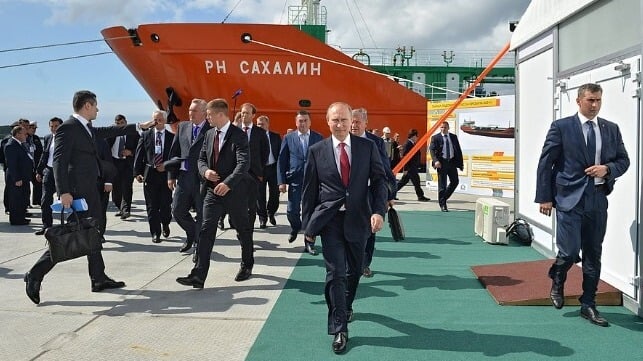Russia's Two Giant Shipbuilders, USC and Zvezda, Are in Merger Talks

Two of Russia’s major shipyards are set to merge, with the country’s shipbuilding sector massively hit by the western sanctions. Last week, Rosneft and the state-owned bank VTB announced start of negotiations which will likely see their shipbuilding divisions folded into one company. Rosneft owns the Far-East Zvezda Shipyard while VTB controls United Shipbuilding Corporation (USC), the primary shipbuilder for the Russian Navy's conventional and nuclear-powered fleets.
“PJSC Rosneft and VTB Bank have begun negotiations on the Zvezda shipbuilding inclusion in the USC. The initiative to consolidate shipbuilding assets in the Far East to increase the sector’s efficiency is supported by the President Vladimir Putin,” the oil company and the state-run bank said in a statement.
According to the Russian newspaper Kommersant, Rosneft’s head Igor Sechin has been spearheading the transfer of Zvezda. In a brief to Putin on October 20, Sechin addressed the merger. Sechin has proposed that the funds from the sale of Zvezda Shipyard should be allocated in developing the Tomtor mining project in the Arctic, which Rosneftegaz plans to manage. The Tomtor project is located in the north-west of Yakutia, Russia and has one of the largest and highest-grade deposits of rare earth elements, including niobium.
The merger negotiations come at a time most of the Russian domestic shipyards have been forced to delay delivery of orders. Last week, Zvezda Shipyard announced further delays in the delivery of two ice-capable LNG carriers, which were scheduled for launch by end of the year. The deliveries of both vessels have been pushed to next year.

that matters most
Get the latest maritime news delivered to your inbox daily.
These two vessels are part of the five Arc 7 LNG carriers currently under construction at the Zvezda shipyard. Partly, the delay in production of these vessels is due to western sanctions, which limit Russia’s access to some key technologies. For instance, the membrane used to create the LNG holding tank, as well as the ships' azimuthing drives, can no longer be provided to Russia.
USC is also struggling to complete orders, with some dating as back as 2017. This has forced Russia to partner with countries such as China and India for extra construction capacity. Recently, Russia selected two Indian shipyards to construct four non-nuclear icebreakers. Limited capacity at USC has left Russia unable to build its ice-class vessels domestically.
